Filter by
Found 12368 from your keywords: subject="Diffusion and the Con...
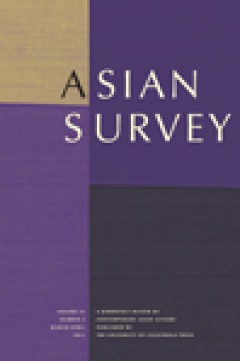
Asian Survey, Volume 53, Number 3 May/June 2013
- Edition
- -
- ISBN/ISSN
- 0004-4687
- Collation
- -
- Series Title
- -
- Call Number
- -
- Edition
- -
- ISBN/ISSN
- 0004-4687
- Collation
- -
- Series Title
- -
- Call Number
- -
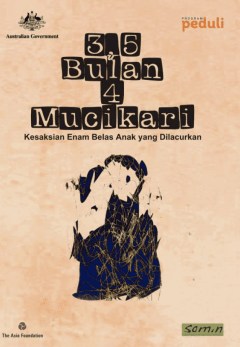
3,5 Bulan 4 Mucikari: kesaksian enam belas anak yang dilacurkan
- Edition
- -
- ISBN/ISSN
- 978-602-52439-1-2
- Collation
- xxiv, 168p.; 21 cm
- Series Title
- -
- Call Number
- 306.7 AMA t
- Edition
- -
- ISBN/ISSN
- 978-602-52439-1-2
- Collation
- xxiv, 168p.; 21 cm
- Series Title
- -
- Call Number
- 306.7 AMA t
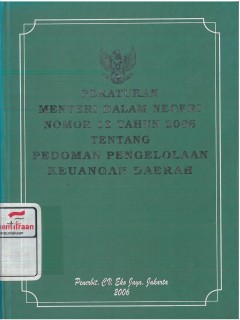
Peraturan menteri dalam negeri nomor 13 tahun 2006 tentang pedoman pengelolaa…
- Edition
- -
- ISBN/ISSN
- -
- Collation
- xii, 816p.; 20,5 cm
- Series Title
- -
- Call Number
- R336.41, PER, p
- Edition
- -
- ISBN/ISSN
- -
- Collation
- xii, 816p.; 20,5 cm
- Series Title
- -
- Call Number
- R336.41, PER, p
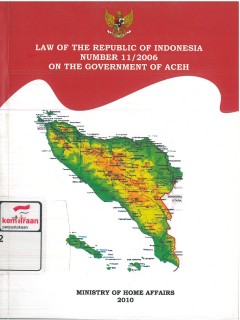
Law of the Republic of Indonesia number 11/2006 on the Government of Aceh
- Edition
- -
- ISBN/ISSN
- -
- Collation
- ii, 214p.; 21 cm
- Series Title
- -
- Call Number
- R352, IND, u
- Edition
- -
- ISBN/ISSN
- -
- Collation
- ii, 214p.; 21 cm
- Series Title
- -
- Call Number
- R352, IND, u
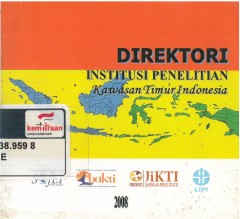
Direktori institusi penelitian Kawasan Timur Indonesia
- Edition
- -
- ISBN/ISSN
- 978-979-18376-0-6
- Collation
- vi, 65p.; 15 cm
- Series Title
- -
- Call Number
- R338.959 8, SOE, d
- Edition
- -
- ISBN/ISSN
- 978-979-18376-0-6
- Collation
- vi, 65p.; 15 cm
- Series Title
- -
- Call Number
- R338.959 8, SOE, d
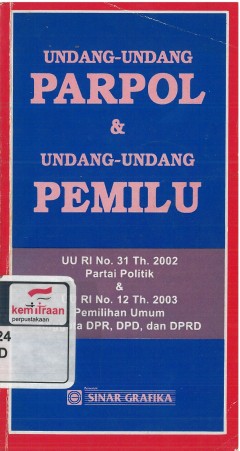
Undang-undang parpol dan undang-undang pemilu: UU RI no. 31 tahun 2002 partai…
- Edition
- -
- ISBN/ISSN
- 979-3421-35-5
- Collation
- viii, 140p.; 20.5 cm
- Series Title
- -
- Call Number
- R324, UND, u
- Edition
- -
- ISBN/ISSN
- 979-3421-35-5
- Collation
- viii, 140p.; 20.5 cm
- Series Title
- -
- Call Number
- R324, UND, u
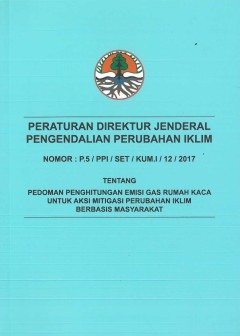
Peraturan Direktur Jenderal Pengedalian Perubahan Iklim Nomor: P.5/PPI/SET/KU…
- Edition
- -
- ISBN/ISSN
- -
- Collation
- 109p.; 21 cm
- Series Title
- -
- Call Number
- R333.7 IND p
- Edition
- -
- ISBN/ISSN
- -
- Collation
- 109p.; 21 cm
- Series Title
- -
- Call Number
- R333.7 IND p

Hand book lembaga ombudsman daerah
- Edition
- -
- ISBN/ISSN
- -
- Collation
- 35p.; 15 cm
- Series Title
- -
- Call Number
- R352.88, PUS, h
- Edition
- -
- ISBN/ISSN
- -
- Collation
- 35p.; 15 cm
- Series Title
- -
- Call Number
- R352.88, PUS, h

Kamus istilah anggaran
- Edition
- 1st print
- ISBN/ISSN
- 979-96570-5-9
- Collation
- 87p.; 18 cm
- Series Title
- -
- Call Number
- R336.41, KHO, k
- Edition
- 1st print
- ISBN/ISSN
- 979-96570-5-9
- Collation
- 87p.; 18 cm
- Series Title
- -
- Call Number
- R336.41, KHO, k

Pemilihan umum 2004 : keputusan panitia pengawas pemilihan umum nomor 17 tahu…
- Edition
- -
- ISBN/ISSN
- -
- Collation
- iii, 157p.; 21 cm
- Series Title
- -
- Call Number
- R324, PAN, p
- Edition
- -
- ISBN/ISSN
- -
- Collation
- iii, 157p.; 21 cm
- Series Title
- -
- Call Number
- R324, PAN, p
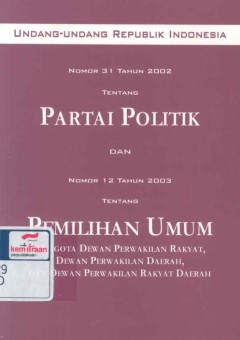
Undang-undang Republik Indonesia nomor 31 tahun 2002 tentang partai politik d…
- Edition
- -
- ISBN/ISSN
- -
- Collation
- 78p.; 23 cm
- Series Title
- -
- Call Number
- R329, UND, u
- Edition
- -
- ISBN/ISSN
- -
- Collation
- 78p.; 23 cm
- Series Title
- -
- Call Number
- R329, UND, u
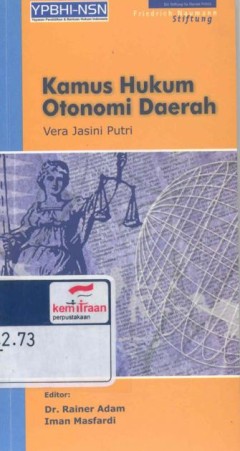
Kamus hukum otonomi daerah
- Edition
- -
- ISBN/ISSN
- 979-96070-6-X
- Collation
- xii, 119p.; 21 cm
- Series Title
- -
- Call Number
- R342.73, PUT, k
- Edition
- -
- ISBN/ISSN
- 979-96070-6-X
- Collation
- xii, 119p.; 21 cm
- Series Title
- -
- Call Number
- R342.73, PUT, k

Indonesisch-Nederlands Woordenboek Privaatrecht : Personen-En Familierecht = …
- Edition
- -
- ISBN/ISSN
- 9067181692
- Collation
- xxvi, 105p.; 24 cm
- Series Title
- -
- Call Number
- 340 MAS i
- Edition
- -
- ISBN/ISSN
- 9067181692
- Collation
- xxvi, 105p.; 24 cm
- Series Title
- -
- Call Number
- 340 MAS i

Indonesisch-Nederlands Woordenboek Privaatrecht : Goederenrecht = Hukum benda
- Edition
- -
- ISBN/ISSN
- 9067181668
- Collation
- xxx, 219p.; 24 cm
- Series Title
- -
- Call Number
- 340 MAS i
- Edition
- -
- ISBN/ISSN
- 9067181668
- Collation
- xxx, 219p.; 24 cm
- Series Title
- -
- Call Number
- 340 MAS i

Indonesisch-Nederlands Woordenboek Privaatrecht : verbintenissenrecht = hukum…
- Edition
- -
- ISBN/ISSN
- 9067181676
- Collation
- xxv, 94.; 24 cm
- Series Title
- -
- Call Number
- 340 MAS i
- Edition
- -
- ISBN/ISSN
- 9067181676
- Collation
- xxv, 94.; 24 cm
- Series Title
- -
- Call Number
- 340 MAS i

Indonesisch-Nederlands Woordenboek Privaatrecht : Belastingrecht Arbeidsrecht…
- Edition
- -
- ISBN/ISSN
- 9067181803
- Collation
- xxvii, irr page; 24 cm
- Series Title
- -
- Call Number
- 340 MAS i
- Edition
- -
- ISBN/ISSN
- 9067181803
- Collation
- xxvii, irr page; 24 cm
- Series Title
- -
- Call Number
- 340 MAS i

Indonesisch-Nederlands Woordenboek Privaatrecht : Burgerlijk Procesrecht = Hu…
- Edition
- -
- ISBN/ISSN
- 9067181706
- Collation
- xxix, 93p,; 24 cm
- Series Title
- -
- Call Number
- 340 MAS i
- Edition
- -
- ISBN/ISSN
- 9067181706
- Collation
- xxix, 93p,; 24 cm
- Series Title
- -
- Call Number
- 340 MAS i

Indonesisch-Nederlands Woordenboek Privaatrecht : Handelsrecht = Hukum dagang
- Edition
- -
- ISBN/ISSN
- 9067181684
- Collation
- xxix, 161p.; 24 cm
- Series Title
- -
- Call Number
- 340 MAS i
- Edition
- -
- ISBN/ISSN
- 9067181684
- Collation
- xxix, 161p.; 24 cm
- Series Title
- -
- Call Number
- 340 MAS i
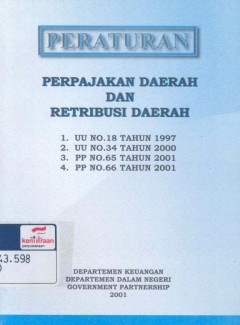
Peraturan perpajakan daerah dan retribusi daerah: UU no. 18 thun 1997, UU no.…
- Edition
- -
- ISBN/ISSN
- -
- Collation
- 160p.; 25 cm
- Series Title
- -
- Call Number
- R343.598, IND, p
- Edition
- -
- ISBN/ISSN
- -
- Collation
- 160p.; 25 cm
- Series Title
- -
- Call Number
- R343.598, IND, p
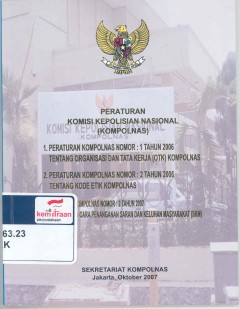
Peraturan komisi kepolisian nasional [Kompolnas]
- Edition
- -
- ISBN/ISSN
- -
- Collation
- irr. pages; 21 cm
- Series Title
- -
- Call Number
- R363.23, SEK, p
- Edition
- -
- ISBN/ISSN
- -
- Collation
- irr. pages; 21 cm
- Series Title
- -
- Call Number
- R363.23, SEK, p
 Computer Science, Information & General Works
Computer Science, Information & General Works  Philosophy & Psychology
Philosophy & Psychology  Religion
Religion  Social Sciences
Social Sciences  Language
Language  Pure Science
Pure Science  Applied Sciences
Applied Sciences  Art & Recreation
Art & Recreation  Literature
Literature  History & Geography
History & Geography